Hardin Library for the Health Sciences winter interim hours begin on Saturday, Dec. 16.
The 24-hour study is available for affiliates whenever the library is closed.
Regular hours resume on Tuesday, Jan. 16.
Hardin Library for the Health Sciences winter interim hours begin on Saturday, Dec. 16.
The 24-hour study is available for affiliates whenever the library is closed.
Regular hours resume on Tuesday, Jan. 16.
Get ready for finals at the Hardin Library. We want you to succeed!
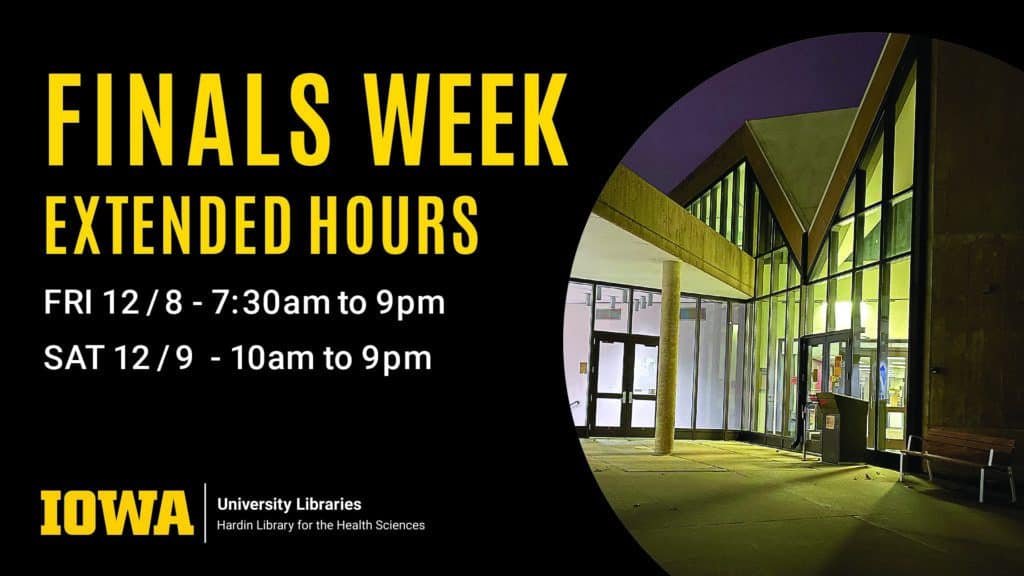

Hardin Library for the Health Sciences librarians Mary Thomas and Jennifer Deberg taught a first-year seminar this semester called “Exploring the Exciting World of Medical Research.”
The class was designed to stimulate students’ curiosity and encourage inquiry to answer their questions. Thomas and Deberg helped them learn to identify and differentiate the major types of health sciences research studies as well as how the scientific method and research life-cycle work. Students developed a research question, learned the process of designing a research project, and understood the dissemination process for research findings.
Here’s a look at the students’ final poster projects presented at the Hardin Library on Oct. 26, 2023.
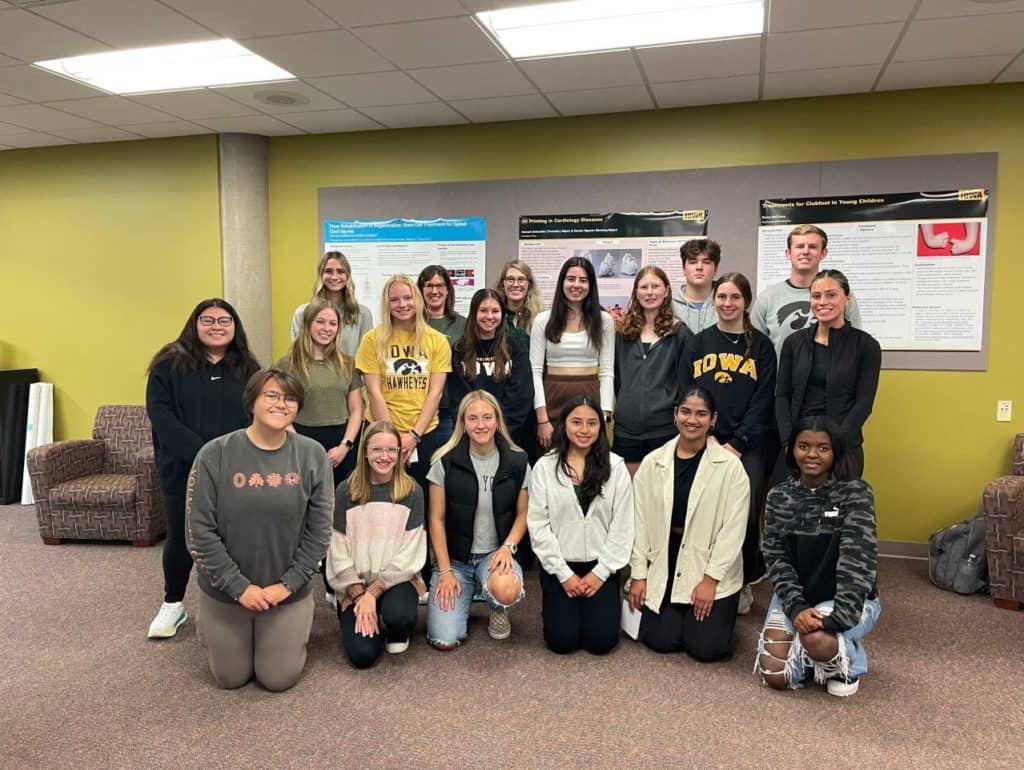

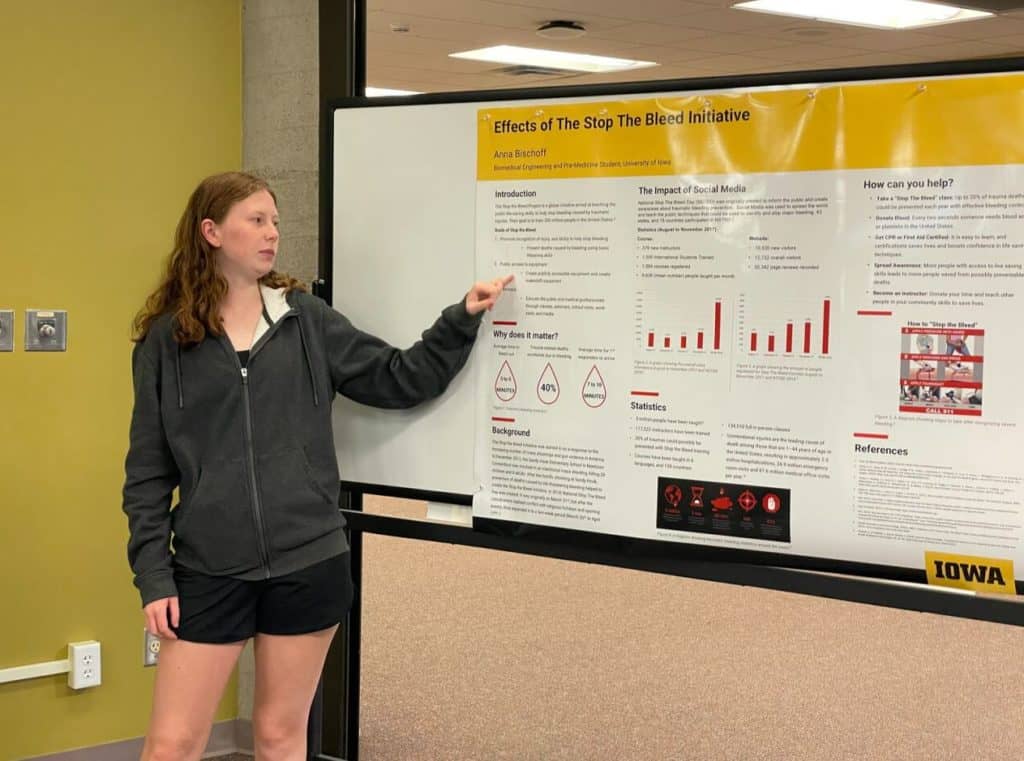
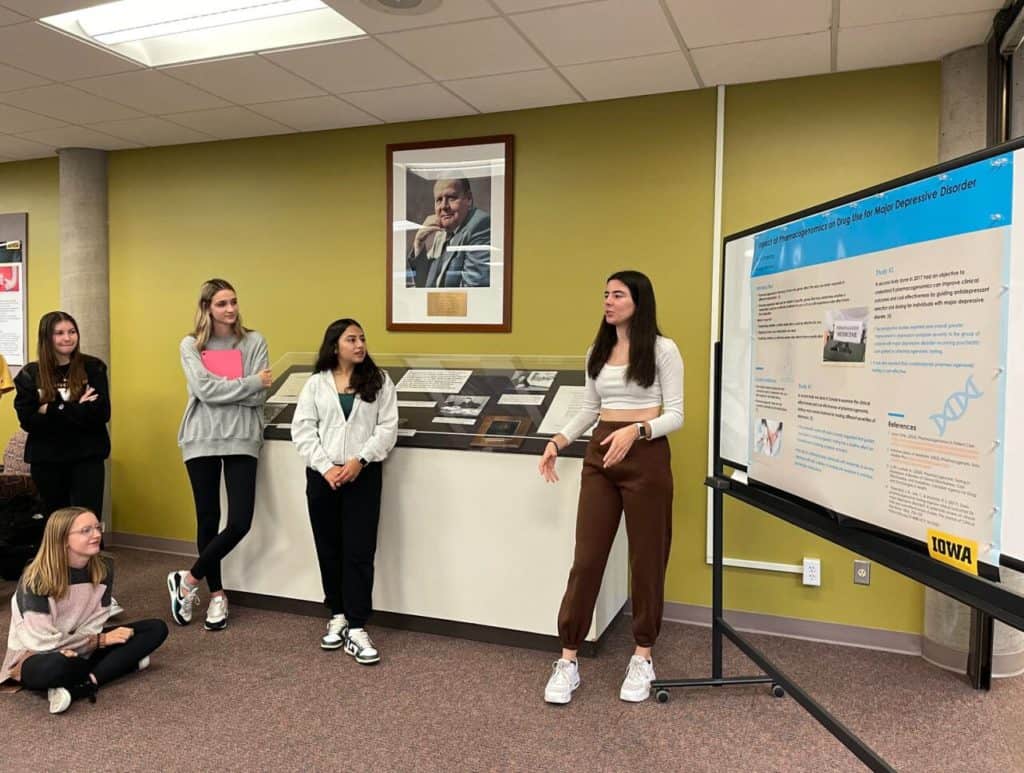
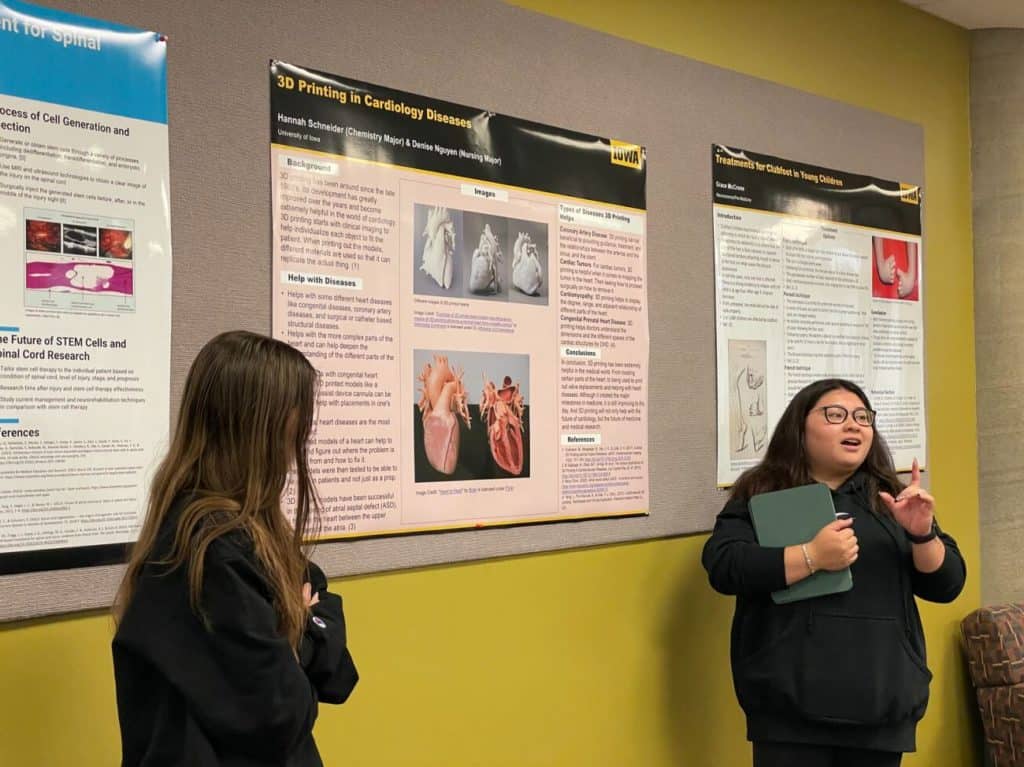
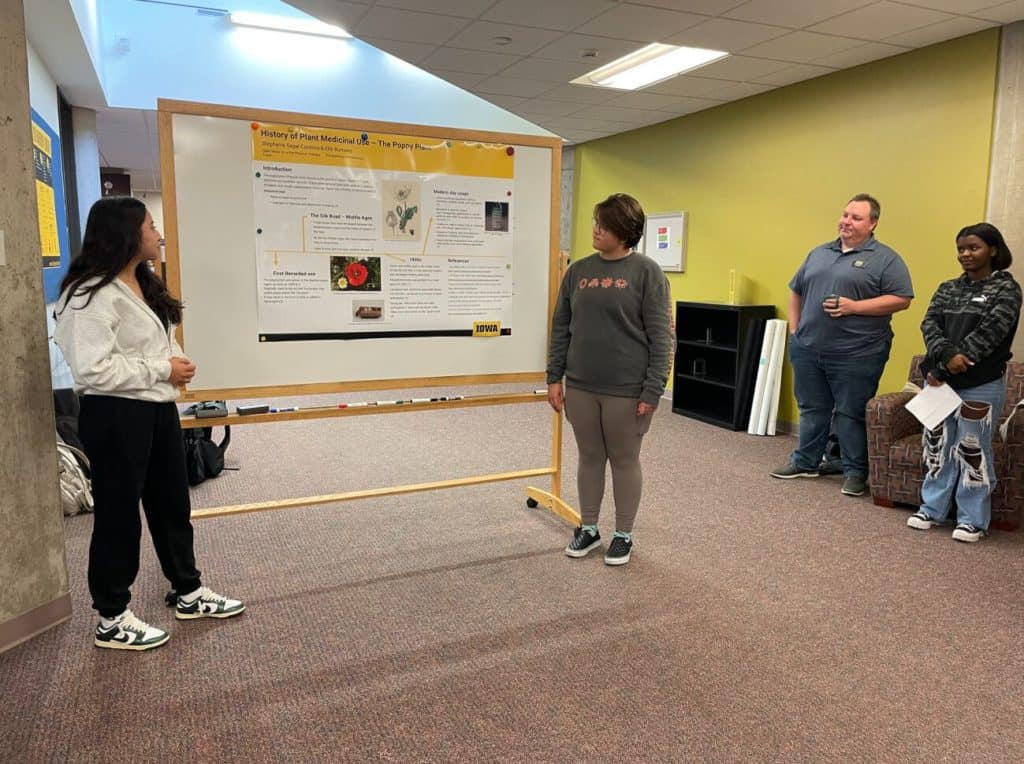
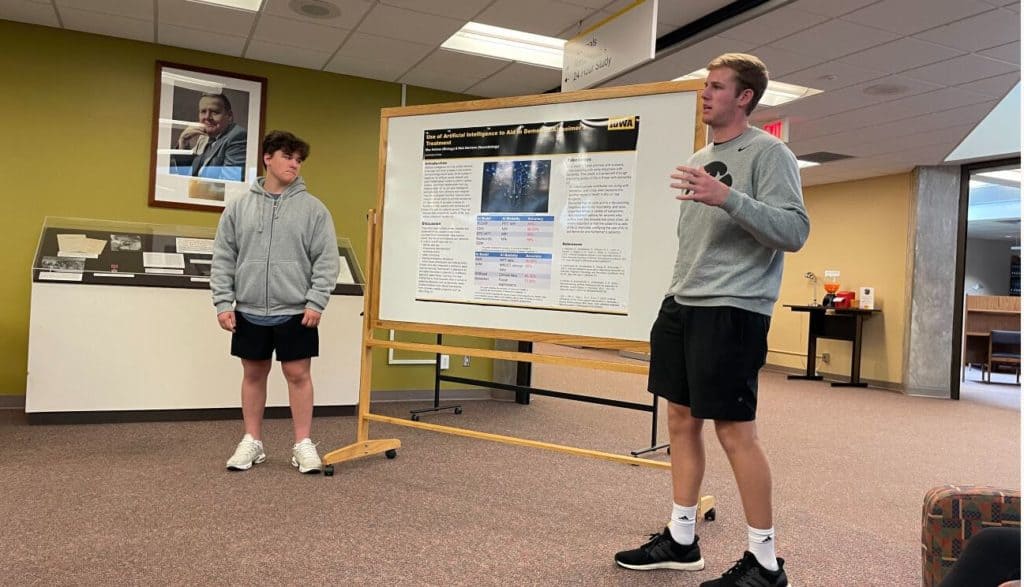
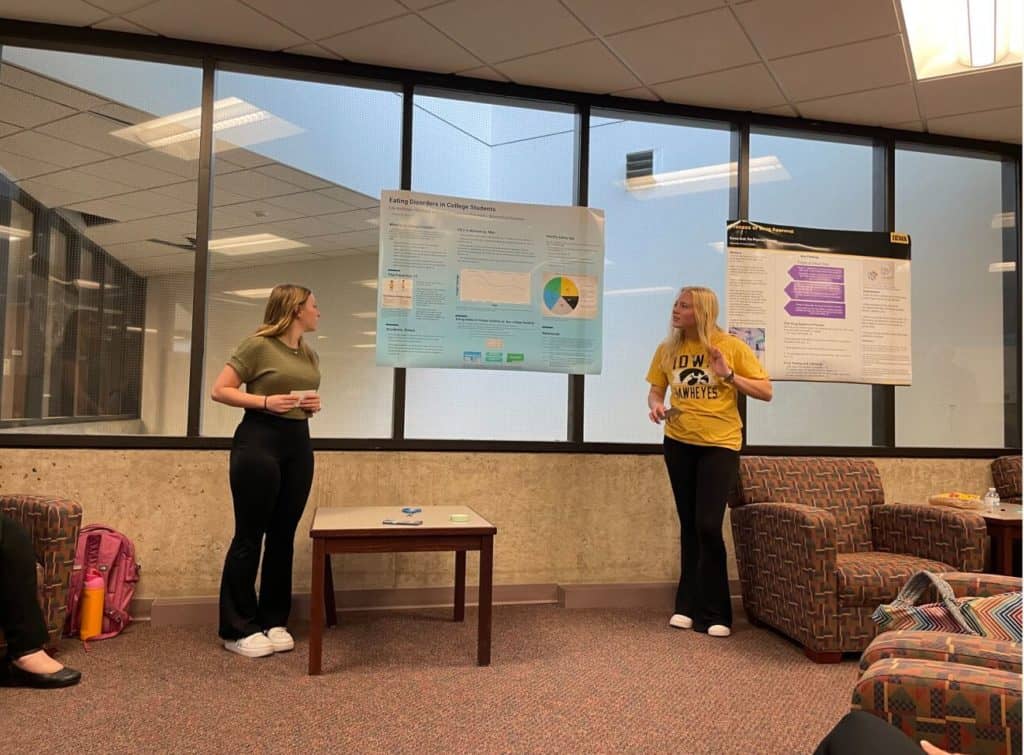
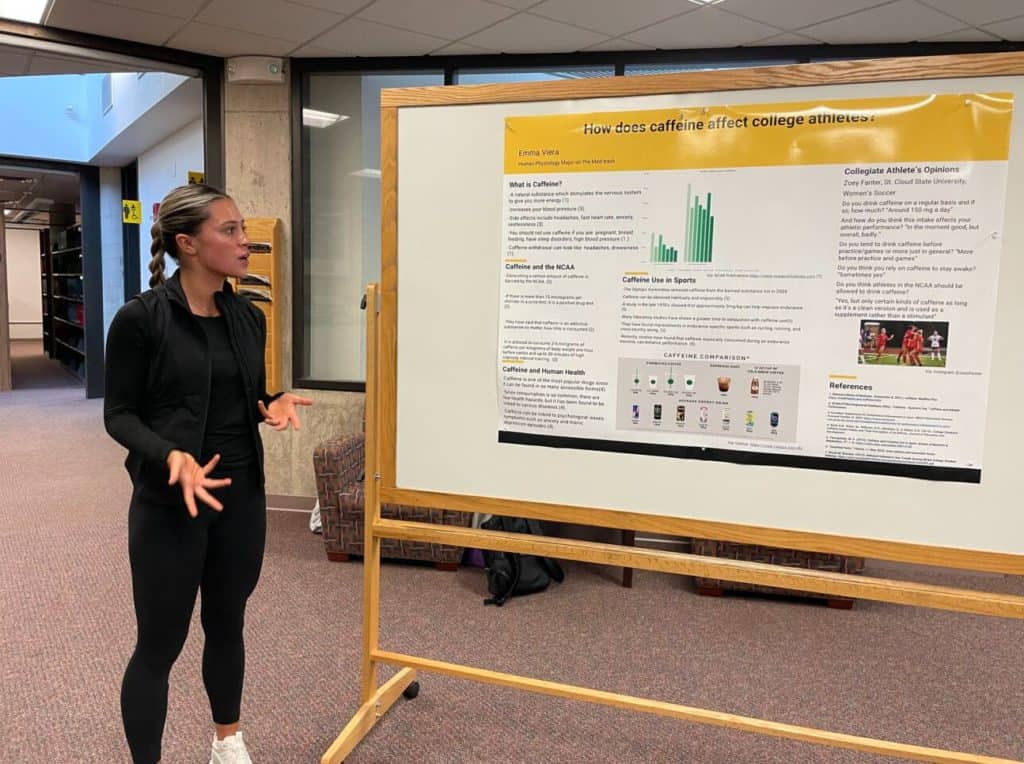

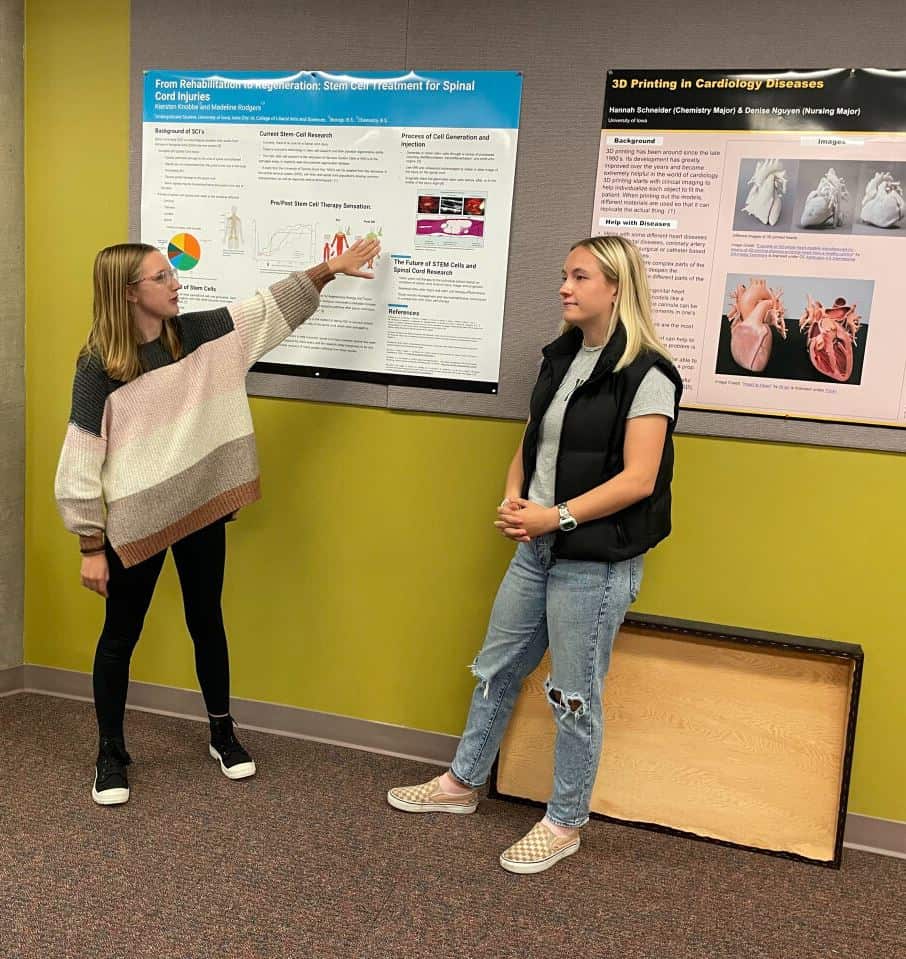
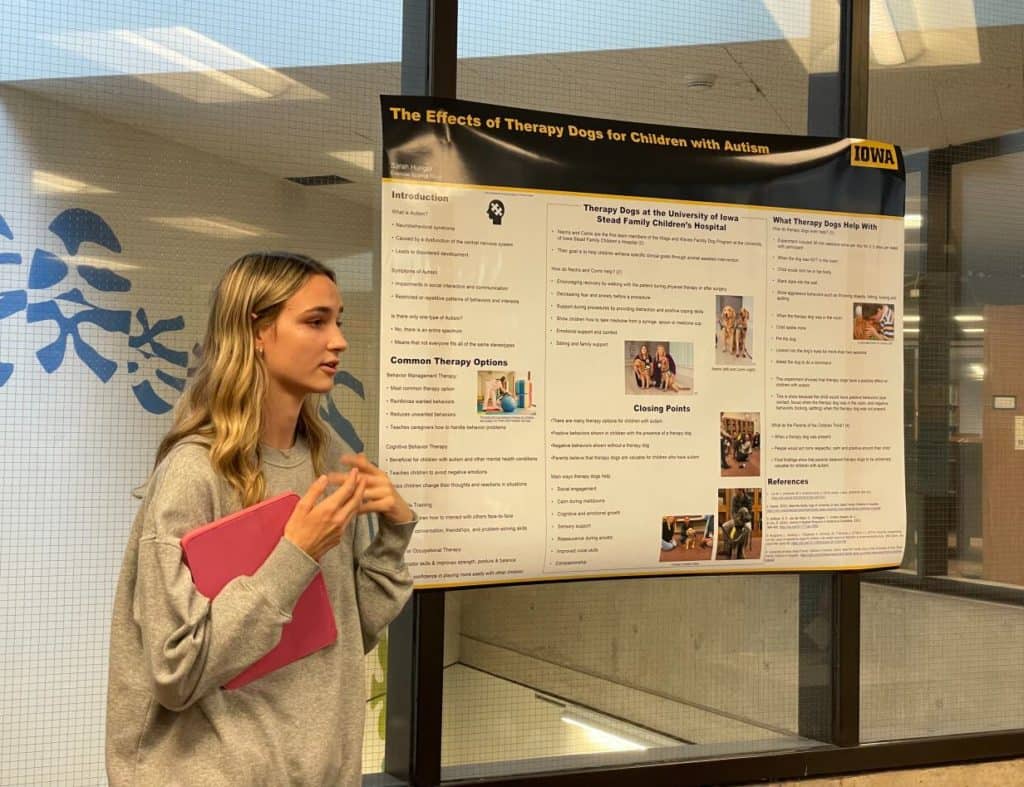
All photographs by Helen Spielbauer. Used with permission.
Hardin Library for the Health Sciences will have different hours during the Thanksgiving holiday break.
The 24-hour study will be available to affiliates with an Iowa OneCard or UIHC badge.
| Sat, Nov. 18 | CLOSED home football game |
| Sun, Nov. 19 | Noon – 9 p.m. |
| Mon, Nov. 20-Wed. Nov 22 | 7:30 a.m. – 6 p.m. Shorter hours |
| Thu, Nov. 23 | CLOSED Thanksgiving Day |
| Fri, Nov. 24 | CLOSED University holiday |
| Sat, Nov. 25 | 10 a.m. – 2 p.m. Shorter hours |
| Sun, Nov. 26 | Noon – 9 p.m. Regular hours resume |
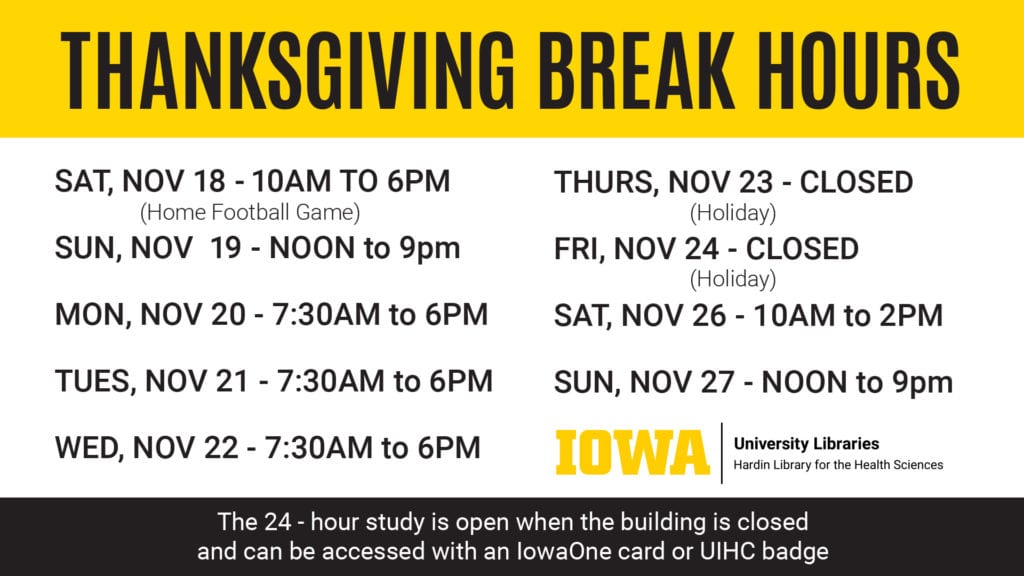
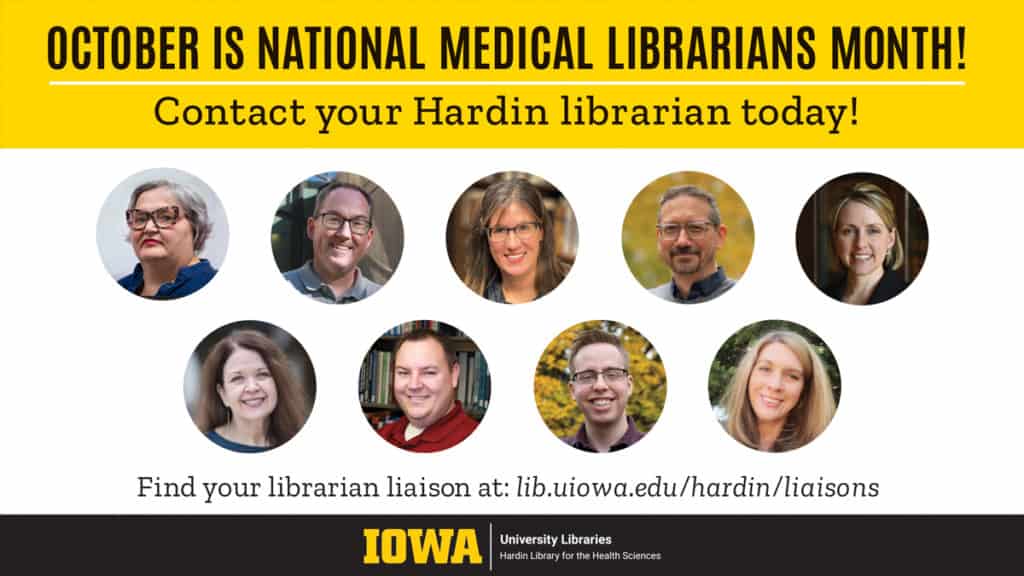
We have a specialist librarian liaison assigned to all health science disciplines. Find your librarian.

by
Giselle Simón
University Conservator
Director, UI Libraries Conservation and Collections Care
This particular treatment was a perfect candidate to test out some momigami, a long-fibered Japanese paper that is coated with konnyaku (a plant mucilage) and crumpled multiple times, giving it a fabric-like texture and strength. To back up a bit, early book repair and restoration treatments usually involved either a complete rebinding or what is known as rebacking: replacing the spine material (usually leather) with new leather and then repositioning the old leather spine piece that contains the titling, onto the newly rebacked spine. Leather work takes practice and skill, but more importantly, it is a naturally acidic material, and book conservators have been utilizing Asian-style papers, like Japanese kozo and Korean hanji for rebacking and mending of leather books since the 1980s.
There are still situations where leather is appropriate, and it’s a thoughtful conversation between curators and conservators, but the flexibility and accessibility of paper make it a great option. In some cases, like this treatment, it allows for more of the original spine to be saved by making small mends or fills rather than removing the entire spine.
This book’s leather covering is very abraded, although it is still structurally stable, giving it a sueded feel. The good thing is that the leather is in stable condition- it’s not suffering from too much desiccation or “red rot.” The spine is almost intact, with just a few areas of loss at the head and tail, a small missing patch over the raised bands, and some loss at the corners.
Using the momigami with its fabric-like nature, I was able to fill areas of loss that mimic the original leather, but the paper also flexes and moves over the joint and around the spine of the book, movement that is needed to open and close it again and again. The momigami provided a strong yet thin bridge between the thick pulp boards and their necessary connection to the spine area as if new ligaments were installed. The paper was also easy to shape when moist with adhesive and can be torn to produce a soft, feathered edge when applying in order to mesh with the original leather.
The paper can also be toned with stable paints, such as acrylics, to soften the interruption between old and new materials. In repairs like this, I try not to hide it completely, but I also want to find a balance for the reader so that it is not a distracting intervention.
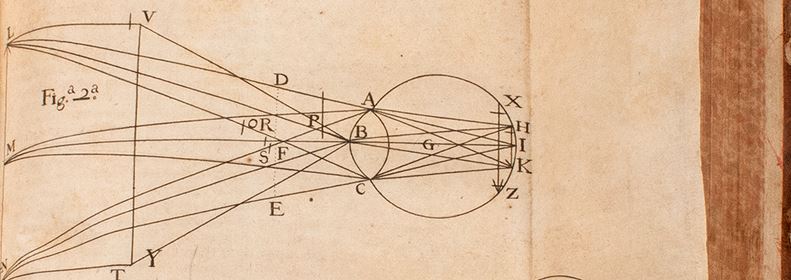
Damien Ihrig, MA, MLIS
Curator, John Martin Rare Book Room
Over time, books can start to show their age. All kinds of things take their toll on a book – fire, pollution, pests, and acidic inks, to name a few. Mostly, though – and this makes me very happy – books just get used. And that use adds up.
Thankfully, we have a crack team of folks who specialize in making sure our books are preserved for as long as possible and continue to be available for our users. Our book this month represents one of the many items that make their way through the gentle and skilled hands of our Conservation and Collections Care staff.
The French scientist and Jesuit priest Honoré Fabri (1608-1688) wrote his Tractatus duo: quorum prior est de plantis, et de generatione animalium; posterior de homine [Two treatises: the first of which is about plants and about the generation of animals; the latter of man] in 1666. It recently spent some time in Conservation for care.
As for Fabri, he was a prominent scientific figure during the 17th century. Jesuit priest was his day job, but he showed an early aptitude and genuine passion for math and science. That passion would eventually get him in trouble with both the Catholic Church and the scientific community, including a short stint in prison and an argument with the famous Dutch polymath Christiaan Huygens that clocked in at five years!
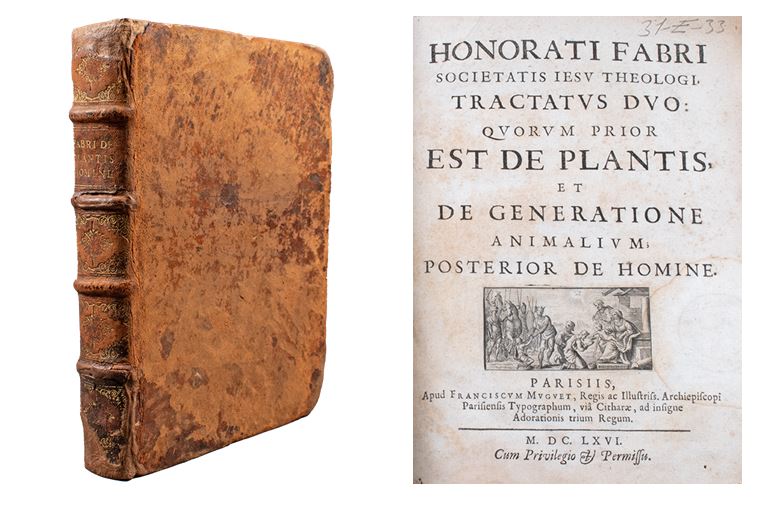
FABRI, HONORÉ (1608-1688). Tractatus duo: quorum prior est de plantis, et de generatione animalium; posterior de homine [Two treatises: the first of which is about plants and about the generation of animals; the latter of man]. Printed in Paris by François Muguet, 1666. 25 cm tall.
Fabri was born April 8, 1608, in Le Grand Abergement. His education started at the Catholic Institute in Belley, where he developed a strong interest in math and science and exhibited a quick wit. He entered the Jesuit Order on October 18, 1626, spending time in Avignon and Lyon for his studies.
Fabri showed a knack for teaching during his tenure as a professor of philosophy in Arles from 1636 to 1638, where he covered subjects like logic, philosophy, and natural philosophy. Fabri’s enthusiasm for teaching and exploring various disciplines led him to hold positions in several Jesuit colleges. He taught logic and mathematics in Aix-en-Provence and later returned to Lyon, where he had a remarkable and productive period as a professor. During this time, he covered a wide range of subjects such as logic, mathematics, natural philosophy, metaphysics, and astronomy. Many of his works were derived from his lectures during this phase.
While Fabri’s teachings were respected, his writings did not sit well within the Jesuit Order for reasons that are not entirely clear. What is clear is that Fabri investigated scientific and philosophical “novelties,” which seem to have irked his conservative colleagues. This led to his removal from teaching in 1646 and a series of reassignments.
He was eventually accused of adhering to the religious and scientific philosophy of Descartes (banned by the church in 1663) and imprisoned.
Fabri also engaged in significant scientific debates during his lifetime. His dispute with Christiaan Huygens about Saturn’s rings is especially notable. Initially, Fabri proposed an alternative theory to Huygens’ ring concept, but after a brief five years of debate, he conceded and adopted Huygens’ theory. Fabri also contributed to astronomy by discovering the Andromeda nebula and working on the theory of tides influenced by lunar action.
In the realm of mathematics, Fabri’s work on calculus is noteworthy. He collaborated with Michelangelo Ricci (the “other Michelangelo”) and significantly impacted the development of calculus, particularly influencing Gottfried Wilhelm Leibniz. In fact, Leibniz placed Fabri with Galileo, Torricelli, Steno, and Borelli for his work on elasticity, vibrations, and the study of motion.
Not content with making his mark solely in mathematics, physics, and astronomy, Fabri made waves in medicine, too, although not without controversy, of course. Some tried to foster a blood feud between Fabri and William Harvey, claiming that Fabri’s lectures indicate he discovered the circulation of blood prior to Harvey. Thankfully, Fabri staunched the flow of discord by stating definitively that “at no time did I ever say that the circulation of the blood had been first discovered by me.”
Contact curator Damien Ihrig to take a look at this book: damien-ihrig@uiowa.edu or 319-335-9154.
During home football games, parking lots are closed, and bus routes are disrupted. If you want to use the library on a home football game day, please plan to walk or get dropped off.
Other University of Iowa Libraries are open during football Saturdays.
Hardin Library will be closed Saturday, Sept. 2 for the home football game.
Hardin Library will be open Sunday, Sept. 3 from Noon-9pm.
Hardin Library will be closed Monday, Sept. 4 for the Labor Day holiday.
Hardin Library will reopen Tuesday, Sept. 5 at 7:30.
Labor Day traditionally means the end of summer.
Summer in Iowa City nature photos ©Jane Bradbury, 2023. Used with permission.
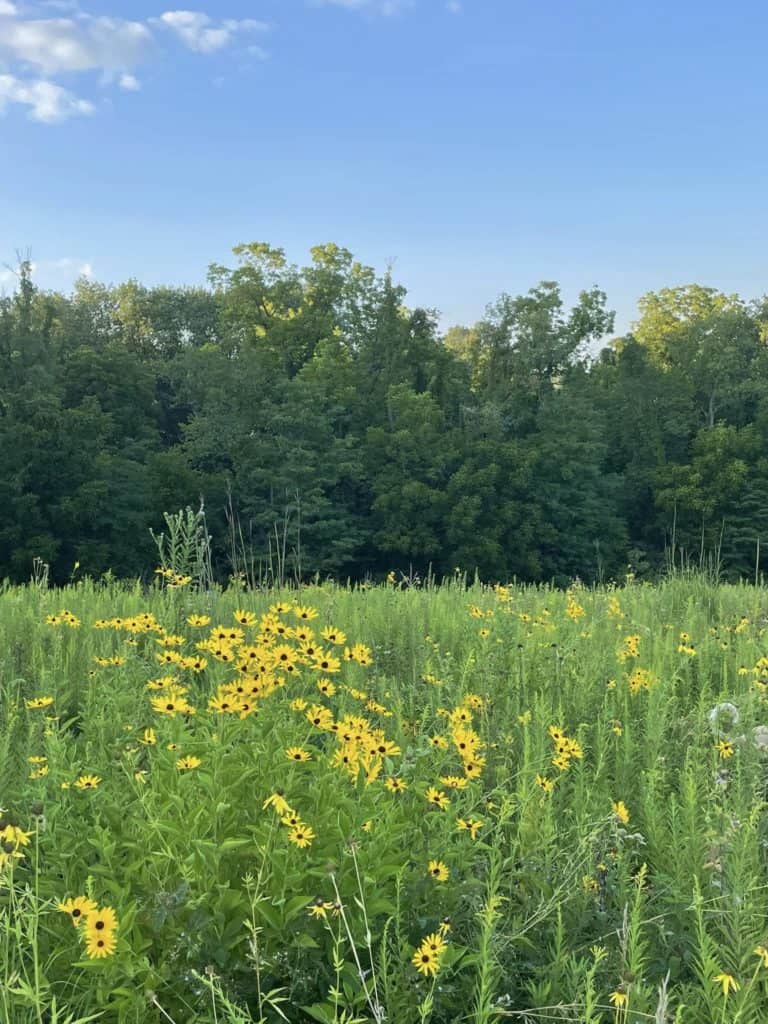

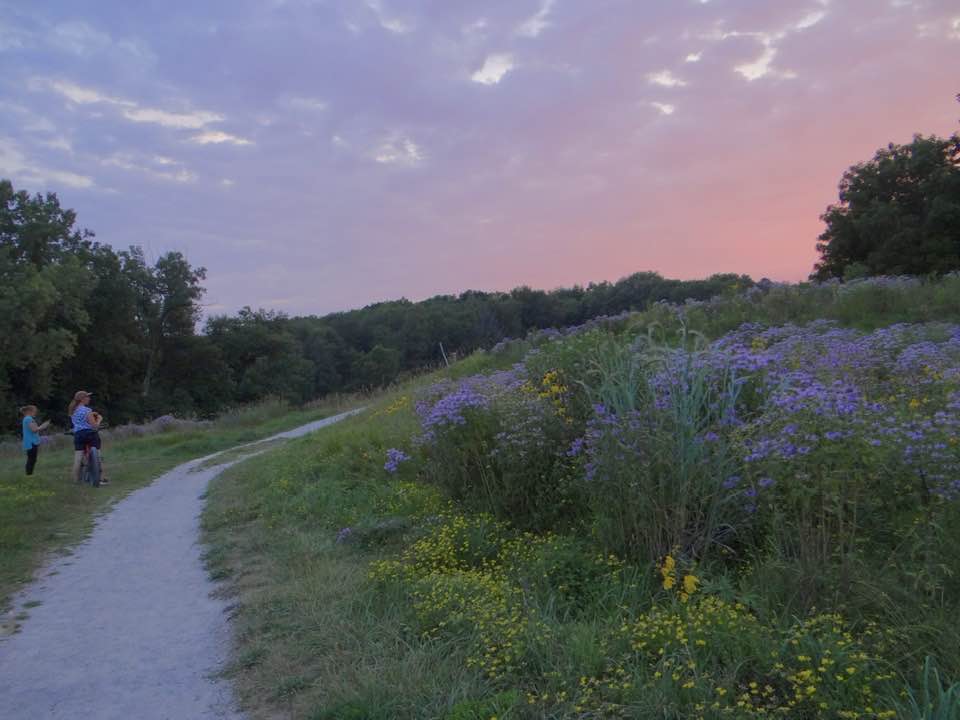





Color and black and white printing are available at the Hardin Library. Students and all University of Iowa affiliates can make printouts and the charges go on your U-Bill.
Black and white printing 3 cents per side
Color printing 15 cents per side
You can send print jobs from home to Hardin Library for pick up.
1. Log into the PaperCut system with your Iowa HawkID and password.
2. Select web print.
3. Upload your documents. All printing will be double-sided using this system.
4. Come to the library within a few hours, log into the print release stations in 24-hour study, 3rd floor, of Information Commons West, or 2nd floor and release the jobs to pick up your printouts.
*We do not recommend releasing your job until you come to the library to keep your materials private and secure.*